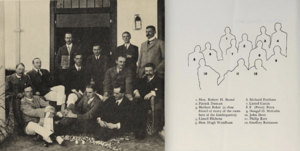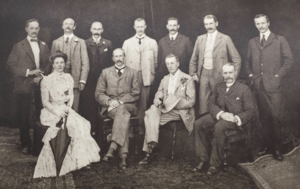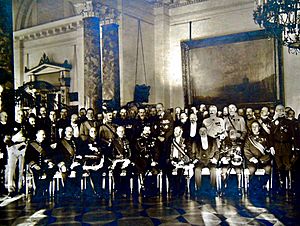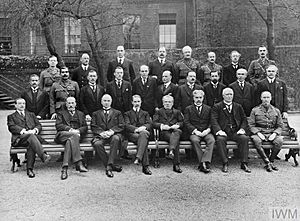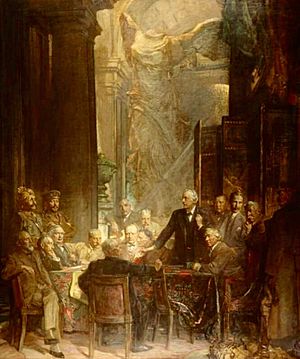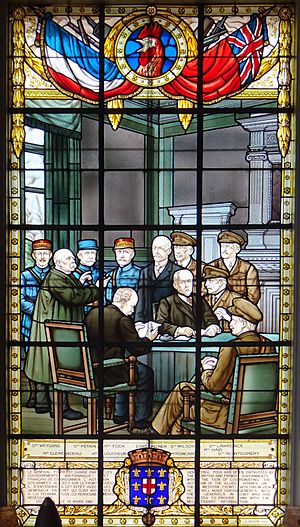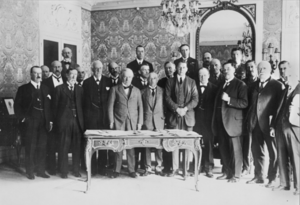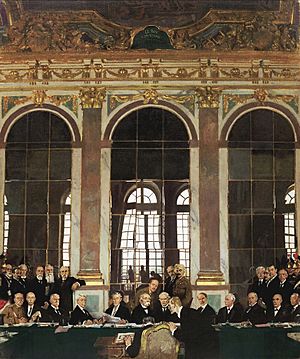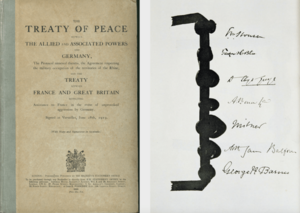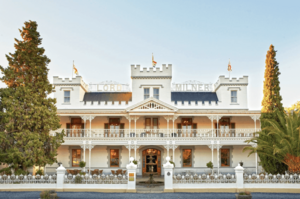Alfred Milner, 1st Viscount Milner facts for kids
Quick facts for kids
The Viscount Milner
|
|
|---|---|
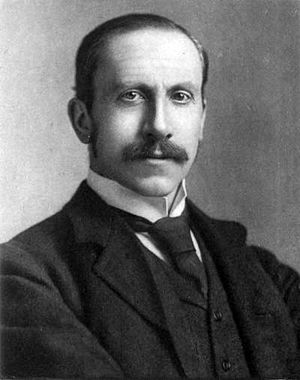 |
|
| Secretary of State for the Colonies | |
| In office 10 January 1919 – 13 February 1921 |
|
| Preceded by | Walter Long |
| Succeeded by | Winston Churchill |
| Secretary of State for War | |
| In office 18 April 1918 – 10 January 1919 |
|
| Monarch | George V |
| Prime Minister | David Lloyd George |
| Preceded by | The Earl of Derby |
| Succeeded by | Winston Churchill |
| 1st Governor of the Transvaal and Orange River Colony | |
| In office 23 June 1902 – 1 April 1905 |
|
| Monarch | Edward VII |
| Preceded by | Himself as Administrator of the Transvaal and Orange River Colony |
| Succeeded by | The Earl of Selborne |
| Administrator of the Transvaal and the Orange River Colony | |
| In office 4 January 1901 – 23 June 1902 |
|
| Monarch | Queen Victoria Edward VII |
| Lieutenant | Hamilton John Goold-Adams |
| Preceded by | Office Established Christiaan de Wet As State President of the Orange Free State (31 May 1902) Schalk Willem Burger As President of the South African Republic (31 May 1902) |
| Succeeded by | Himself As Governor of the Transvaal and Orange River Colony |
| Governor of the Cape Colony and High Commissioner for Southern Africa |
|
| In office 5 May 1897 – 6 March 1901 |
|
| Monarch | Queen Victoria Edward VII |
| Prime Minister | John Gordon Sprigg William Philip Schreiner John Gordon Sprigg |
| Preceded by | Sir William Howley Goodenough |
| Succeeded by | Sir Walter Francis Hely-Hutchinson |
| Personal details | |
| Born |
Alfred Milner
23 March 1854 Gießen, Upper Hesse, Grand Duchy of Hesse |
| Died | 13 May 1925 (aged 71) Great Wigsell, East Sussex, England |
| Resting place | Saint Mary the Virgin Church, Salehurst, East Sussex, England |
| Nationality | British |
| Spouse | Violet Milner |
| Alma mater | University of Tübingen King's College London Balliol College, Oxford |
| Occupation | Colonial administrator, statesman |
| Signature |  |
Alfred Milner, 1st Viscount Milner (23 March 1854 – 13 May 1925) was an important British statesman and colonial administrator. He helped shape British foreign and domestic policy from the mid-1890s to the early 1920s. During World War I, from December 1916 to November 1918, he was a key member of Prime Minister David Lloyd George's War Cabinet.
Contents
Early Life and Education
Alfred Milner was born in Giessen, a town in what is now Germany. His father was a doctor and a professor. Alfred studied at the University of Tübingen in Germany, then at King's College School and Balliol College, Oxford in England. He was a very bright student, winning several scholarships. After finishing his studies, he worked as a journalist and later became a lawyer.
Early Career and Time in Egypt
Milner first worked as a journalist for the Pall Mall Gazette. In 1885, he tried to become a Member of Parliament for the Liberal Party but didn't win. He then became a private secretary to a government minister. In 1889, he was appointed as an under-secretary of finance in Egypt. He spent four years there, helping with important financial reforms. When he returned to England in 1892, he wrote a book called England and Egypt, which explained the British work there. He then became chairman of the Board of Inland Revenue.
Milner in Southern Africa
In 1897, Alfred Milner was chosen to be the High Commissioner for Southern Africa and Governor of Cape Colony. This was a very difficult job because of tensions in the region, especially after an event called the Jameson raid. Milner's goal was to protect British interests while also trying to be fair to the governments of the South African Republic (also known as the Transvaal) and the Orange Free State.
He traveled widely to understand the people and the land. He even learned Dutch and Afrikaans to better understand the local Afrikaner (Dutch-speaking) people. Milner soon realized that there would be no peace in South Africa as long as British people were treated unfairly in the Transvaal.
The Uitlander Problem
After gold was discovered in the Transvaal, many people, mostly British, moved there to find their fortune. These newcomers were called "Uitlanders" (meaning "outsiders"). The Transvaal's president, Paul Kruger, refused to give them the right to vote. The Afrikaners, also known as Boers, had created the Transvaal Republic to live away from British rule. They had even fought and won against the British in the First Boer War.
Milner believed that if the British didn't take control of South Africa, the wealthy Transvaal could unite with other Afrikaners and threaten Britain's power. He saw the "Uitlander" issue as a way to push for British control. He wanted the Transvaal government to treat the British settlers equally.
Leading to War
Milner became a strong voice in the British government, arguing for war with the Boer republics to secure British control. He met with President Kruger in 1899 and made three demands:
- The Uitlanders should get the right to vote right away.
- English should be used in the Transvaal parliament.
- All laws passed by the Transvaal parliament should be approved by the British Parliament.
Kruger refused these demands, and the Second Boer War began in October 1899.
During the war, Milner supported the military efforts. In 1901, he took over the administration of the two Boer states, which were now part of the British Empire. He was made Baron Milner and later Viscount Milner in recognition of his work.
Rebuilding South Africa
After the war ended in May 1902, Milner faced the huge task of rebuilding the country. He worked to:
- Bring the Boer people back home.
- Help British settlers move to the land.
- Improve education and justice.
- Develop railways.
He also introduced a tax on gold mines to help fund the rebuilding. To help him, Milner gathered a group of talented young administrators, many from Oxford, who became known as "Milner's Kindergarten".
One challenge was a shortage of workers in the gold mines. Milner agreed to a plan to bring in Chinese workers on three-year contracts. This was a common practice at the time. While some issues arose, Milner took responsibility and said that certain practices, like flogging for minor offenses, were wrong.
Milner left South Africa in April 1905. He believed that a united South Africa would become a strong part of the British Empire.
Censure Motion
In 1906, some politicians criticized Lord Milner for how the Chinese workers were treated. A motion was put forward to officially blame him. However, the government decided not to directly blame him, saying it was more important for peace in South Africa. Many people supported Milner, and a public letter signed by over 370,000 people praised his work in Africa.
Businessman
After returning from South Africa, Milner became involved in business. He was chairman of a mining company and a director of a bank. He continued to support the idea of free trade within the British Empire.
First World War
During World War I, Lord Milner became a very important figure. He believed in universal conscription, meaning all men of a certain age should be required to join the military. He held small meetings at his home to discuss the war, and he became close with David Lloyd George, who later became Prime Minister.
Milner was a strong critic of how the war was being managed. He believed a smaller, more effective war cabinet was needed. In December 1916, Lloyd George became Prime Minister and asked Milner to join his new, small War Cabinet. Milner accepted and became one of Lloyd George's closest advisors.
Wartime Minister
As a member of the War Cabinet, Milner did not lead a specific government department. Instead, he focused on the overall direction of the war effort. He helped with many domestic issues related to the war, such as negotiating with miners and managing food rationing.
In 1917, Milner led a British group on a mission to Russia to see what equipment they needed and to boost their morale. He also came up with the idea of an Imperial War Cabinet, where leaders from Britain's major colonies (like Canada and Australia) would have a say in how the war was run.
Milner played a key role in solving crises during the war. He helped get thousands of tractors for farming to prevent a food shortage in Britain. He also supported Lloyd George in making changes to the military leadership, replacing top admirals and generals who were not performing well. In April 1918, Milner himself became the Secretary of State for War.
Milner was also a main author of the Balfour Declaration, an important statement about creating a national home for the Jewish people in Palestine.
The Doullens Conference
On March 21, 1918, Germany launched a massive attack on the Western Front. The British and French armies were pushed back, and there was confusion. On March 26, Lord Milner traveled to Doullens, France, to meet with the Allied generals and leaders.
At this critical meeting, Milner, acting as Prime Minister Lloyd George's representative, made a crucial decision. He convinced the generals to appoint Ferdinand Foch as the overall commander of all Allied forces. This decision brought unity to the Allied command and helped stop the German advance. The Germans were eventually pushed back, leading to the end of the war on November 11, 1918. An inscription at Doullens Town Hall says that this decision "saved France and the freedom of the world."
Post-War Role
After the war, in December 1918, Lord Milner became the Secretary of State for the Colonies. He attended the Paris Peace Conference, 1919, where the Treaty of Versailles was signed. He was one of the British representatives who signed the treaty. He also helped decide the future of Germany's overseas colonies.
Milner was also involved in discussions about the Peace Treaty of Vereeniging, which ended the Second Boer War. He believed that even though the peace was tough for the Boers, it was fair. This fairness helped the Boers become strong allies with Britain in World War I.
Last Years and Death
Lord Milner retired in February 1921. He was honored with the Knight of the Garter award. He married Lady Violet Cecil and remained active in the Rhodes Trust, which supports scholarships.
He died on May 13, 1925, at the age of 71, from sleeping sickness, shortly after returning from South Africa. He was buried in East Sussex, England. A memorial tablet to him can be found in Westminster Abbey.
Milner was instrumental in making Empire Day a national holiday in 1916. He also suggested the two-minute moment of silence observed on every anniversary of the armistice.
Depictions
- Lord Milner is shown in William Orpen's famous painting, The Signing of Peace in the Hall of Mirrors.
- The town of Milnerton, South Africa, is named after him.
- He is also featured in the oil painting Statesmen of World War I, which is displayed at the National Portrait Gallery in London.
Credo
Among Milner's personal papers, a statement of his beliefs, called his Credo, was found and published. It became very popular. In it, he described himself as a "British race patriot" and an "Imperialist." He believed that the British people should stay united and that the British Empire should be a strong, permanent union of states.
He also wrote about the South African War, saying that British and Dutch people could unite under the idea of a large "empire-state" where both would be partners. He believed that a true Imperialist was also the best South African.
Honours
- CB: Companion of the Order of the Bath – 1894
- KCB: Knight Commander of the Order of the Bath – 1895
- GCMG: Knight Grand Cross of the Order of St Michael and St George – 1897
- GCB: Knight Grand Cross of the Order of the Bath – 1 January 1901
- KG: Knight of the Order of the Garter – 1921
Works
- Alfred Milner, England in Egypt (1894) online free
- Alfred Milner, Arnold Toynbee: A Reminiscence (1895) online free
- Alfred Milner, Never Again: A speech given in Cape Town on April 12, 1900
- Alfred Milner, Speeches of Viscount Milner (1905) online free
- Alfred Milner, Constructive Imperialism (1908) online free
- Alfred Milner, The Nation and the Empire; Being a collection of speeches and addresses (1913) online free
- Alfred Milner, The British Commonwealth (1919) (summary of, pgs. 197–198, 352: Link)
- Alfred Milner, Questions of the Hour (1923) online free ('Credo' in 1925 edition)
See Also
 In Spanish: Alfred Milner para niños
In Spanish: Alfred Milner para niños
- Oxford University - Lord Milner was elected Chancellor of Oxford University
- London School of Economics - Lord Milner was elected an Honorary Governor of the London School of Economics
- Pro-Jerusalem Society - Viscount Milner was Honorary Member of its leading Council
Images for kids


